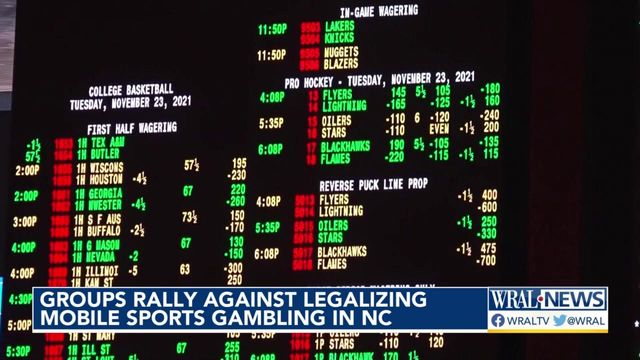North Carolina House lawmakers approve mobile sports betting bill
Similar legislation failed in the North Carolina House by a single vote in 2022. But the chamber backed the bill this year to legalize gambling on professional, college and other sports from cellphones and other electronic devices.
Posted — UpdatedNorth Carolina House lawmakers approved betting on professional and college sports from a cellphone or other electronic device, an issue debated for more than two years.
The House voted 66-45 for legalization Tuesday, a sharp change from less than a year ago when a similar bill failed by a single vote.
A final vote, typically a formality, is expected Wednesday. The bill then moves to the Senate, which passed similar legislation in the last session. Unlike other high-profile bills at the legislature, sports wagering attracted both support and opposition from Republicans and Democrats.
In the House, eight amendments pushed by legalization opponents to modify the bill in a variety of ways, including removing college sports from the bill, were defeated soundly.
More than two dozen states have legalized mobile sports gambling since a 2018 U.S. Supreme Court decisions gave states the authority. Proponents, which include the state's professional sports teams and some venues, point to a loss of revenue from gamblers who use out-of-state or off-shore accounts.
"Unfortunately, North Carolina is falling behind," said Rep. Jason Saine, a Lincoln County Republican and the top proponent of the legislation. "Every month that goes by, we are leaving money on the table."
"This bill is going to hurt our state, and I hope you remember the fact that your vote in this bill is your legacy," said Rep. Jay Adams, a Catawba County Republican. "It's your wager on whether this will accomplish what the bill sponsors say it will accomplish or it will result in the information that you can see all around you about the impacts of gambling."
The latest version of the bill, modified before the House rules committee Tuesday morning, does not include parimutuel wagering on horse or dog races, moves the start date to Jan. 8 and increases the amount of money for athletic departments at the 10 UNC System schools that do not compete at the Football Bowl Subdivision level.
Those schools would receive 20% of tax revenue, up from 10%, after required distributions. The state's general fund would receive 50%, down from 60%.
The bill had more than 50 co-sponsors in the House, and an array of lobbyists representing gambling operators, professional sports teams and other entities interested in bringing mobile sports betting to the state. Many found Saine after the vote to shake hands or give a quick pat on the back.
Sports gambling is legal in North Carolina, but only in-person at three tribal casinos in the state.
Some of the debate Tuesday centered around advertising by the operators and the concerns that it will be ubiquitous, attract the attention of children and lure problem gamblers onto apps.
The bill has more than 50 sponsors in the 120-member House.
If passed, the bill must clear the Senate, which voted for similar legislation last session, and be signed by Gov. Roy Cooper, who has indicated his support and included revenue from sports gambling in his latest two-year budget proposal.
Related Topics
• Credits
Copyright 2024 by Capitol Broadcasting Company. All rights reserved. This material may not be published, broadcast, rewritten or redistributed.






